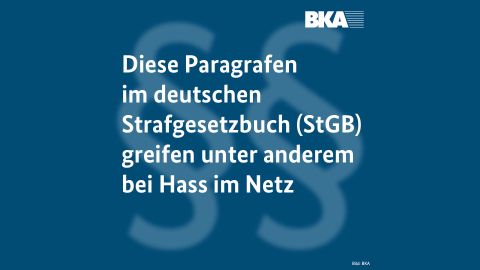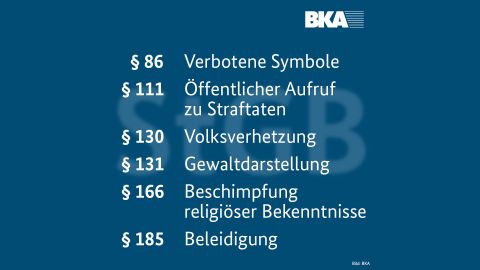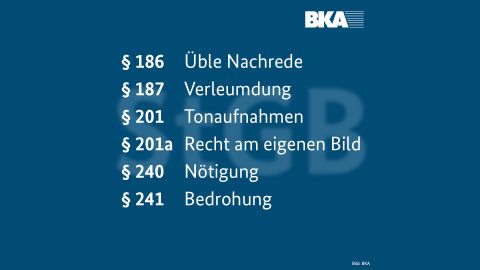Numerous media partners from NRW and Germany are also taking part. They send conspicuous comments on the media partners' forum pages directly to the Central and Contact Point Cybercrime NRW of the Cologne Public Prosecutor's Office (ZAC NRW) as a suspicious activity report. This office then assesses whether the comments are criminally relevant.
This first point of contact of the public prosecutor's office then forwards comments worthy of prosecution to the NRW State Criminal Police Office (LKA NRW), which then immediately initiates initial investigations into the author. All project members are constantly intensifying their contacts with the social media platforms in order to obtain information about the perpetrator as quickly as possible.
What began as a founding initiative of RTL, WDR, Rheinische Post-Online of the NRW Media Authority, Deutsche Welle, Express, Kölner Stadtanzeiger and eco-Verband der Internetwirtschaft e.V. is now developing into a successful model.
Numerous other media outlets in North Rhine-Westphalia are now supporting the initiative to take action against hate speech online. Since March 2020, the following cooperation partners have joined the initiative to jointly counter extremist statements on the internet and in online forums:
- Deutschlandradio
- Die Aschendorff Medien (Westfälische Nachrichten)
- Der Patriot
- Die Glocke
- The Emsdettener Volkszeitung
- The Hellweger Anzeiger
- the General-Anzeiger Bonn
- das Medienhaus Aachen
- the Münsterländische Volkszeitung
- the Recklinghäuser Zeitung
- the Remscheider General-Anzeiger
- the Solinger Tageblatt
- the Siegener Zeitung
- the Westdeutsche Zeitung
Justice and police in other federal states have since established similar collaborations based on the NRW project
Early action against racist propaganda
The aim of the joint project between the public prosecutor's office and the police is to consistently prosecute obviously illegal postings on social media platforms instead of just deleting them. This joint initiative removes the perpetrator from anonymity in order to consistently counter racist propaganda.
The Network Enforcement Act (NetzDG), which has been in force since 2017, is an important building block in the fight against hate crime online. Social networks can now be held more accountable than before. Among other things, its introduction has led to posts being deleted as a result of a large number of complaints following criminal investigations. The possibility of transmitting criminal content, which is thus anchored in the NetzDG, must be followed by the initiation of criminal proceedings.
An innovation will soon oblige social network providers subject to the NetzDG to promptly report certain criminal content to the Federal Criminal Police Office (BKA). From there, criminal prosecution is then to be initiated by the responsible law enforcement authorities via the respective state criminal investigation office. This is a small section of the draft bill currently under discussion. Changes are still possible as a result.
Hate postings on the internet - verbal derailment or racist crime?
Unfortunately, the line between the freedom of expression enshrined in the German constitution and the provisions of criminal law is too often crossed on the internet. Hate postings are classified as so-called "hate crime". These include crimes with xenophobic, Islamophobic, anti-Semitic or homophobic backgrounds.
If the circumstances of the crime or the attitude of the perpetrator indicate that he or she is making a corresponding statement accessible to one or more users on the internet, the police record this crime as politically motivated hate posting when starting the investigation.
This includes numerous criminal offences such as incitement to hatred, public incitement to commit crimes and the dissemination of symbols of unconstitutional organizations. Further processing of these cases is carried out by the state security services of the NRW police if the suspect is resident in NRW.
The perpetrators operate from virtual anonymity
The internet plays an important role here, as it offers broad and fast distribution channels for "hate postings" via social media applications.
An increasing brutalization of communication, which is also aimed directly at socially and politically engaged individuals, has been observed. People from the far-right spectrum in particular use this opportunity to publish and disseminate their right-wing populist statements, sometimes openly, sometimes covertly.
Perpetrators obviously feel protected from prosecution in the anonymity of the internet. However, the internet is by no means a lawless space - the police and judicial authorities also prosecute here.
In addition, the LKA NRW has been participating with great success in the annual nationwide "Action Days to Combat Hate Postings on the Internet" since 2016. Here, facts from the joint initiative with the ZAC NRW are presented and evidence is secured in a publicity-effective manner.
Tolerating and integrating those who think and believe differently
As a task for society as a whole, successful prevention of hate crime requires not only consistent law enforcement, but also close cooperation with all relevant public and private institutions. In addition to the above-mentioned project, the NRW police are therefore also actively involved in the integrated action plan against right-wing extremism and racism.
Your information on criminal offenses
If you would like to report criminal content on the Internet to the police, you can do so online via our Internet Watch or at any police station.



